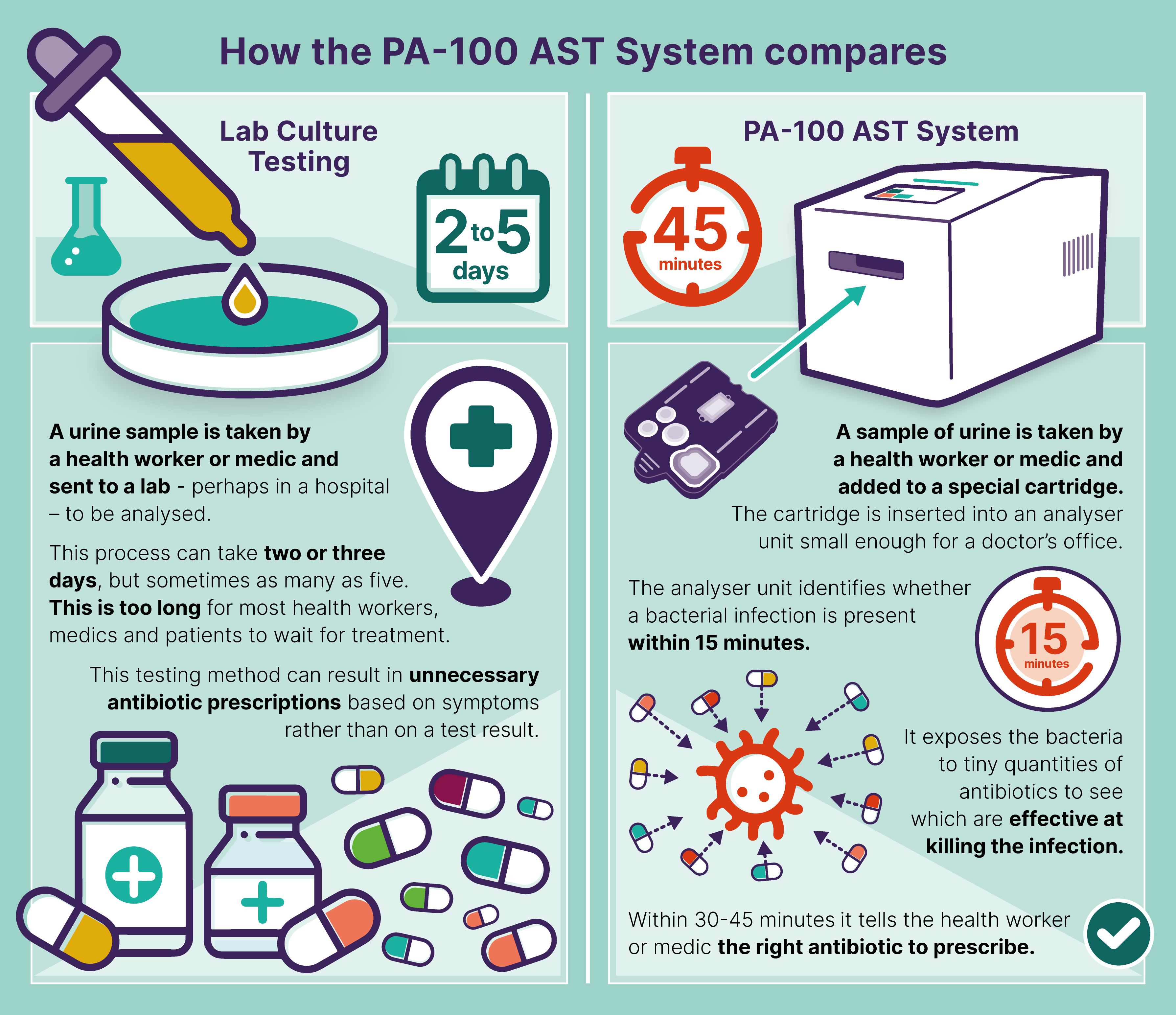Sysmex Astrego AB
Country: Sweden
What infection type does your test focus on? Urinary Tract Infection, Bloodstream Infection
What does your test detect? Bacterial infection and multiplexed phenotypic antibiotic susceptibility
About the Team:
On 12 June 2024, Sysmex Astrego’s PA-100 AST System was named the winner of the Longitude Prize on AMR.
The team’s journey began in academia where it was focused on understanding the mechanics of bacteria. It first entered the prize in 2015 as Rivendell Fluidics, before Astrego was founded in 2017. The real-time Antibiotic Susceptibility Test (AST) utilises patented technology developed in the Elf lab at Uppsala University.
The Longitude Prize on AMR shifted the team’s focus to commercialisation of its research into a real-world diagnostic, with the prize’s criteria shaping the PA-100 AST System from the outset of development.
The PA-100 AST System can identify the presence of a bacterial infection in 15 minutes and which targeted antibiotic to prescribe within 45 minutes, compared to 2-3 days for a lab culture. It is the first time a point-of-care test is capable of identifying a specific infection and its susceptibility to specific drugs by observing how the patient’s infection responds in real-time to different antibiotics (a phenotypic test).
A tiny urine sample of 400 microlitres is added to a smartphone-sized cartridge that contains a specialised nanofluidic chip. The cartridge is inserted into an analyser unit – about the size of a shoebox – which reads the chip sample at a cellular level.
The analyser unit is fully automatic and maintenance free. Before winning, analyser units have been subjected to over six-years of simulated lifetime testing without breaking down.
It paves the way for a future where patients receive an accurate test to identify the precise drug for their infection, and a future where doctors and health workers can prescribe targeted medicines with full confidence at point-of-care – ending the scenario of “just in case” prescriptions.
Since the test can identify which specific antibiotic can treat an infection, it will likely allow older first-line antibiotics – many of which have been retired through fear that some people’s infections have developed resistance to them – to be brought back into use because the test is able to demonstrate whether an infection is susceptible to a specific antibiotic.
Twitter: @AstregoDx
LinkedIn: @astrego
Website: https://astrego.se/

Johan Elf PhD, Founder of Astrego Diagnostics, Professor of Physical Biology at Uppsala University said:
“The Longitude Prize has been incredibly important in shaping the PA-100 system. Back in 2015 we were working on developing measurement technology exclusively to answer basic science questions. When we heard about the Longitude Prize, we realised that the technology could be really useful in the fight against AMR, and the prize criteria have guided our work to develop a transformative test.”
Mikael Olsson, CEO and co-founder, Sysmex Astrego, winners of the Longitude Prize on AMR said:
“The PA-100 AST System challenges bacteria present in a patient’s urine with microscopic quantities of antibiotics in tiny channels embedded in a cartridge the size of a smartphone. We rapidly pinpoint whether a bacterial infection is present and identify which antibiotic will actually kill the bugs, guiding doctors only to prescribe antibiotics that will be effective. We have already started rolling out the test in Europe, we’re running studies in surgeries across the UK and working with regulators to secure additional approvals. The £8m prize will support us to tailor the test for use with different kinds of UTIs and antibiotics, speeding up access for more patients.”
